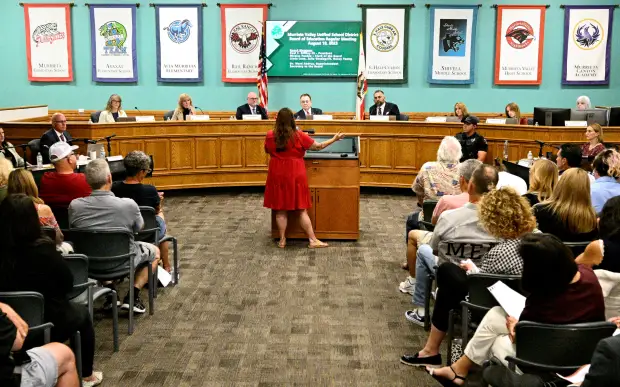By: Leela Xie
In a time when societal conversations are increasingly centered on gender identity and LGBTQ+ rights, educational institutions find themselves at the crossroads of policy, privacy, and inclusivity. The recent decision by the Murrieta Valley Unified School District to implement a policy requiring staff to inform parents about a student’s transgender or gender-nonconforming identity has sparked passionate debates, reflecting the larger cultural landscape. This move, which closely mirrors a policy in the neighboring Chino Valley Unified School District, raises important questions about privacy, the role of parents, and the well-being of transgender students (The LA Times).
The Murrieta Valley School Board’s 3-2 vote in favor of the new policy was met with cheers and applause from attendees, underscoring the passionate beliefs held on both sides of the issue (The LA Times). The policy’s proponents argue that parents should be fully informed about their children’s well-being, including their mental and physical health at school. Board President Paul F. Diffley III expressed that transparency should be upheld in the best interest of both students and parents, stating that “ I have a fundamental right as a parent to bring up my child.” (The LA Times). This viewpoint stems from the belief that parents are the primary protectors and caregivers, equipped to offer guidance and support to their children in navigating matters of gender identity and expression.
However, this seemingly straightforward proposition has ignited concerns from various stakeholders, including educators and LGBTQ+ advocates. The policy’s critics contend that such mandates could infringe upon the privacy of transgender and gender-nonconforming students, potentially leading to unintended consequences. In a statement, the California Department of Education emphasized the “legally protected privacy interest under the California Constitution” for students regarding information about their gender identity (The LA Times). The importance of safeguarding vulnerable students’ well-being, including transgender students, is a central concern for these advocates.
Furthermore, the debate extends to broader issues of educational autonomy and state guidance. The meeting itself was not without its complexities, with State Superintendent of Public Instruction Tony Thurmond urging the board to withdraw the policy, echoing a similar request made to the Chino Valley Unified School District (The LA Times) This tension between local control and state oversight underscores the larger cultural shift where conversations about gender identity and LGBTQ+ rights are becoming increasingly central in education and other spheres.
The Murrieta Valley Unified School District’s decision also draws parallels with recent policy developments in the Chino Valley and Temecula Valley Unified School Districts, highlighting the ongoing “culture war” surrounding LGBTQ+ issues. While Chino Valley’s policies led to heated debates, the Temecula Valley board initially rejected state-approved LGBTQ+ history lessons, later reversing the decision under pressure from state authorities (The LA Times). These instances underscore the deep-rooted disagreements surrounding LGBTQ+ education and representation in schools, often pitting local boards against state mandates.
Navigating the complex landscape of gender identity in schools requires a delicate balance between respecting the privacy and autonomy of students while ensuring their well-being and support. As the nation grapples with these important conversations, the challenge remains to find a common ground that protects individual rights, upholds educational values, and fosters inclusivity.
During these debates, it’s essential to remember that students’ needs, identities, and well-being should remain at the heart of educational policies. Striking the right balance between privacy and transparency is undoubtedly a nuanced task, requiring open dialogue, empathy, and a commitment to inclusivity from all sides. The path forward will require careful consideration, respectful discourse, and a recognition of the evolving role schools play in shaping both individual lives and societal norms.
Source:
Murrieta school district passes policy on transgender students – Los Angeles Times (latimes.com)+-











